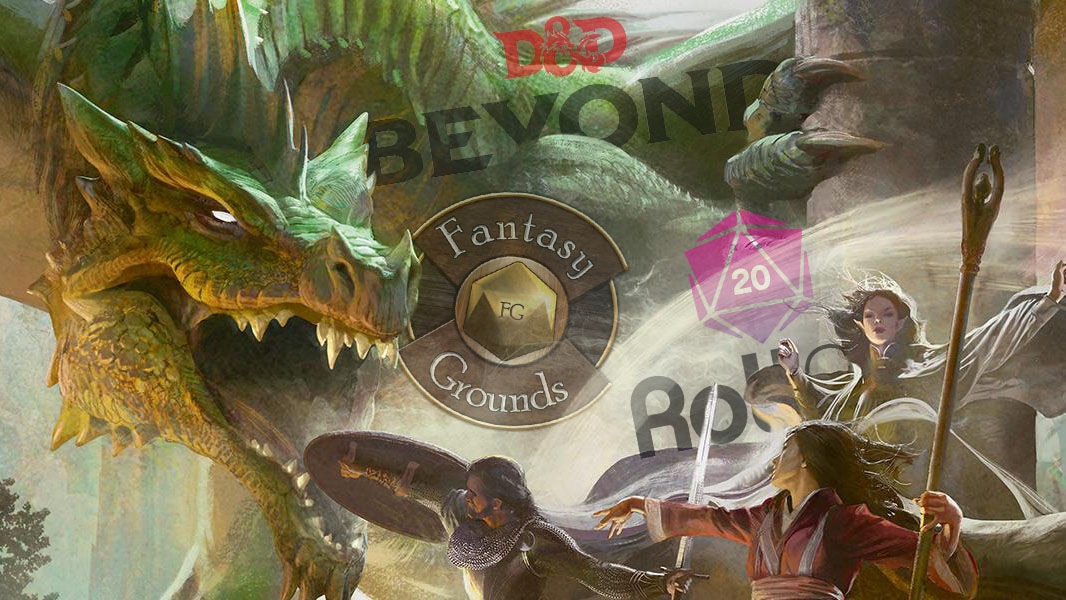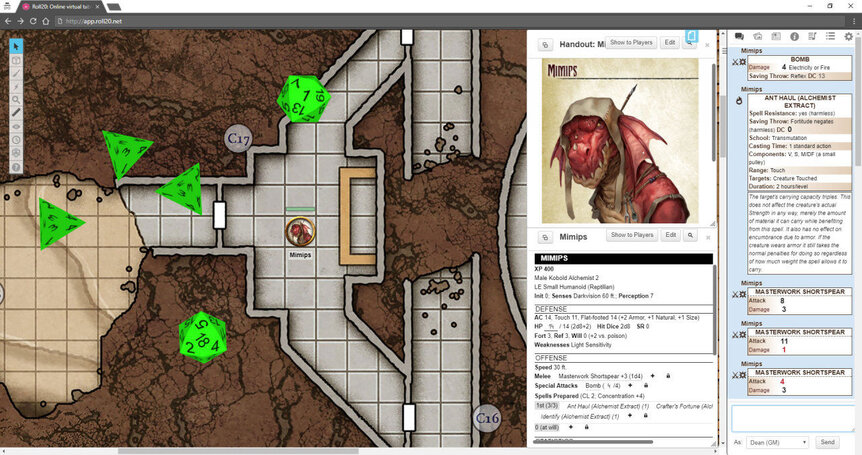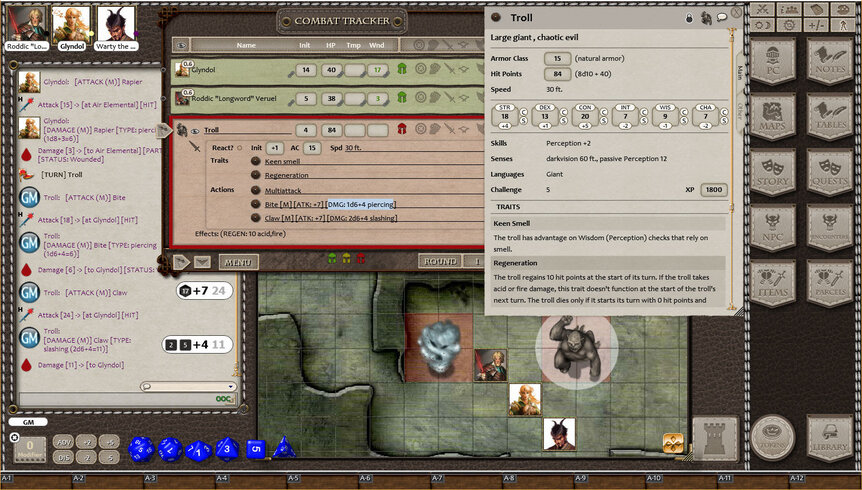Create a free profile to get unlimited access to exclusive videos, sweepstakes, and more!
Dungeons & Dragons players turn to virtual tabletops in record numbers due to coronavirus

Any wizard or warlock worth their salt knows how to magically use astral projection to move through the ethereal plane while their bodies stay safely put. Dungeons & Dragons players who are self-isolating to combat the spread of the coronavirus pandemic, though, don't have that option. COVID-19 has put a stop to most campaigns that meet in person, but luckily there are a number of ways for groups to continue playing remotely, using virtual tabletops or other online resources. In this time of social distancing, many of those digital resources are more popular than ever before.
Virtual tabletops — programs like Roll20 and Fantasy Grounds — have been around for several years, and there are plenty of adventuring parties who have exclusively used a real-time, interactive virtual map to play Dungeons & Dragons or other roleplaying games up to this point. Rather than gather around a physical table, players will log on to a website, often one that has the rules and mechanics integrated into the program; if players live in different cities or states, virtual tabletops can be the only way to play.
Now, though, the coronavirus pandemic has made virtual gaming the only responsible way to play, regardless of how close party members live to one another in the real world.
"We have seen a huge spike in users," Doug Davison, the president and owner of Smiteworks USA, which created Fantasy Grounds, tells SYFY WIRE. "It's becoming a mandatory thing where that's the only way people can still get together and game."
Davison estimates a spike of "about tenfold," as 6,000 or 7,000 new users signed up for Fantasy Grounds in the past couple of days before our conversation last Thursday. Roll20 has seen a notable increase of new users as well, and not just in the United States. Nolan T. Jones, Roll20's co-founder and managing partner, says the site saw an initial surge in Italy, which was hit hard by the coronavirus in early March.
"That allowed us to do some preparation and be working to figure out what the next realms on this were," Jones tells SYFY WIRE, explaining that it helped Roll20 prepare for a similar influx of first-time players for when things got bad in the U.S. "There was a day last week where we had more Italians sign up for the service than we had Americans. We've never had that happen before."
D&D Beyond — which is not technically a virtual tabletop but more of a character-creator and compendium that's often used in conjunction with other tools for online play — is getting a COVID-19 bump, too. Adam Bradford, Vice President of Tabletop Gaming at Fandom, which owns D&D Beyond, says the service's normal number of new users has doubled in the past two weeks, and they're also seeing a similar increase in the number of active users. Additionally, Avare, a bot that D&D Beyond created to ease online play on the popular gaming chat service Discord, has seen a threefold increase in use.
"The last couple of weeks, in particular, we're seeing higher than ever before engagement on the platform as obviously people are staying home and trying to entertain themselves through gaming," Bradford says.
For Dungeon Masters and players alike, the jump to digital isn't without its downsides. ("The number one thing virtual tabletops are missing is pizza," Jones says, only half-kidding because food and snacks are an integral part of the social aspect of many in-person games.) Playing with a virtual tabletop means learning how to use a new interface, which can be a barrier to some. And, given how licensing works, to fully integrate all of the official Dungeons & Dragons material, a DM might need to re-purchase digital versions of books they've already bought once, although this isn't a necessity.
"The thing that you're clearly going to be missing when playing remote during this crisis is human interaction," Bradford says. "You're going to miss the little side-conversation jokes that happen, you're gonna have to slow down the pace of the game. It's going to be missing some of the physical body language interactions and elements that make this game so great. But, again, I think it's absolutely better than not being able to play at all, and we all need a little entertainment as we're self-isolating."
Everyone SYFY WIRE spoke to recommended that players use some sort of video conferencing program, like Google Hangouts or Zoom, in addition to a virtual tabletop. Being able to see one another helps replace some of that missing social interaction, and it can help cut down on crosstalk, the bane of any remote D&D session. (One tip to prevent your party members from accidentally talking over your epic speech? Be the level-12 Barbarian who raises their hand.)
There are benefits to virtual play beyond just being able to game during this time of social distancing. Fantasy Grounds and Roll20 offer ways for DMs to create dungeons with a "fog of war" of sorts, meaning players can only see what the DM wants them to see. Doing this in real life often requires drawing on the fly or haphazardly obscuring a pre-drawn map with pieces of paper and removing them as needed. Additionally, Davison says the newest version of Fantasy Grounds has a feature that lets players and DMs "speak" in the various languages their characters know. Characters who speak Dwarvish, for instance, would be able to read written text, but characters who don't would only see unintelligible runes in their chatbox.
There's plenty of opportunity for players who are moving to the virtual world to take their campaign to the next level, but it's important not to get overwhelmed.
"My biggest piece of advice is that you don't have to do everything. Just like tabletop games in general, sometimes if you're getting into Dungeons & Dragons, you go ‘Oh my gosh, I've got to read all of these manuals otherwise I'm going to be bad at this.' That's a false fear," Jones assures. "Same with virtual tabletop tools. ‘Oh my gosh, I've got to set up every macro and use every feature.' No, we're a toolset, you can use as much or as little if you want.
"I'd compare it to how some people just play with a dry-erase board and some markers, some people go out and buy gorgeous figurines and model castles," he continues. "Neither one of those versions of play is wrong, do what feels right to you, and have fun."
It's unclear how much longer the coronavirus pandemic will last, though there are estimates that it will be months — perhaps more than a year — before things are back to normal. It's going to be a long, uncertain, and scary time, but at least players still have the option to escape to a fantasy world for a couple of hours now and then.
"If this kind of crisis happened in our world 30 or 40 years ago, we could not even be able to continue the game," Bradford says. "It's a massive growth that we have the technology available to us. Regular games of friends and family that had been playing for, potentially, years can continue to play during this time."




























